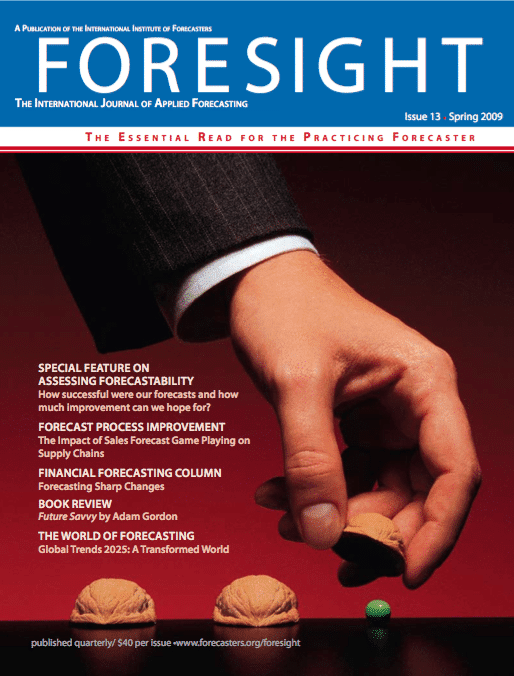FORESIGHT, Issue 13
$45.00
Description
Spring 2009 Issue
Special Feature: Assessing Forecastability
- Forecastability: Insights from Physics, Graphical Decomposition, and Information Theory by Peter Catt
My aim with this paper is to equip forecasters with some cross-disciplinary theory on forecastability and to provide practical techniques for assessing how forecastable a historical time series is. A time series is a sequence of values at equally spaced time intervals: days, weeks, months, quarters, or years. The historical time series can be viewed as an outcome (realization) of an underlying data generating process (DGP). Assessments of forecastability require an understanding of the DGP and its components. - Toward a More Precise Definition of Forecastability by John Boylan
The idea of forecastability has been championed by Kenneth Kahn (2006). In fact, the term “forecastability” can be interpreted in various ways. It can relate to an assessment of the stability of a data series, as in Peter Catt’s (2009) usage. It can also refer to the degree of accuracy when forecasting a time series and can indicate the precision with which we estimate an expected range for the Mean Absolute Percentage Error (MAPE) when employing a time-series method. - How to Assess Forecastability by Stephan Kolassa
The forecastability of time series is a question forecasters often grapple with. Is a particular time series being forecast as well as possible? When forecast errors appear to be high, our natural impulse is to try to improve the forecast. But if a time series simply cannot be accurately forecast, then spending time and resources on attempts to do better will be time and resources wasted. In such a case, you’re better off living with the bad forecasts and investigating how to mitigate their effects. Clearly, to determine forecastability would be a huge advantage.
Articles
-
- The Impact of Sales Forecast Game Playing on Supply Chains by John Mello
Game playing has been defined as the intentional manipulation of a forecasting process to gain personal, group, or corporate advantage. And the consequences can be severe. John Mello provides a fascinating description of the games forecasters can play, identifying the organizational environments that can foster game playing, and recommending a variety of policies to discourage continuation of the practice. - Global Trends 2025: A Transformed World by Ira Sohn
The recently released report Global Trends 2025: A Transformed World, by the U.S. National Intelligence Council (NIC) – Despite the merely modest success rate of forecasts and projections—whether short or long term, scaled to a local, national or global level, or economic or political in nature—the powers that be just can’t seem to get enough of them. - Forecasting Sharp Changes by Roy Batchelor
We have learned yet again just how bad we are at forecasting sharp and hard-to-reverse changes in economic conditions. The linear models that perform well most of the time aren’t cut out for this job. Waiting in the wings are some nonlinear models – of regime switches, catastrophes, and critical network events – that explain how normally stable, complex systems can become unstable, and that might actually provide us with dependable early warnings of bubbles and crashes. - Book Review by David Orrell
Future Savvy by Adam Gordon - Forecaster in the Field: Rob Dhuyvetter
- The Impact of Sales Forecast Game Playing on Supply Chains by John Mello







